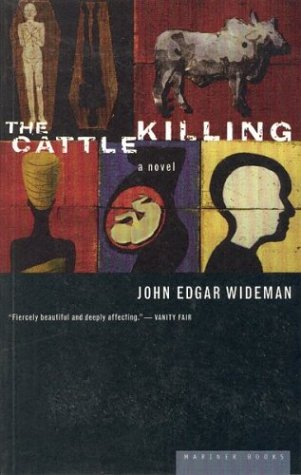

 |

|

The average rating for The cattle killing based on 2 reviews is 3.5 stars.
Review # 1 was written on 2012-05-07 00:00:00 David Vanderwoude David VanderwoudeSometime in the eighteenth century, the Xhosa people of South Africa followed the advice of an early-day intelligence report--an oracle--and began destroying their cattle in the belief that the slaughter would help them avoid European domination. The killing of their number one means of sustenance proved even more self-destructive than our own flocking to follow pied pipers Rumsfeld, Cheney, and Bush. At least so far. Richard Wideman’s The Cattle Killing uses this historical event as a metaphor for the centuries of destruction and self-destruction of culture and identity that have characterized the collision of blacks and whites unto our own times. The protagonist is a young itinerant preacher who, in the 1790’s Philadelphia countryside, attracts a small following of rural blacks who are religious but weary of the dry, negative sermons of the local white Methodist preacher. The narrator is highly spiritual and also, significantly, epileptic. His preaching is part of his search for meaning in a world where kindly benefactors are also rapists, where God saves parentless children by guiding them to an orphanage, then allows them to be burned to death, where a black man and a white woman cannot hope for a fulfilling marriage no matter how devoted they are to one another. For all the racial strife in the book, The Cattle Killing is not in the vein of a Richard Wright civil rights protest. It probes much deeper than that. One of the real historic personages in the book is Bishop Richard Allen, a black Episcopalian who split off from the church and later founded the African Methodist Episcopal Church. (Wideman goes into none of that. I just happen to know it.) In a crisis of the soul that has nothing, however, to do with race, the narrator stands in the ashes of the orphanage deathtrap and declares to Allen his loss of faith. He seeks to hurt the Bishop, he says, with his renunciation of God and religion. The Bishop gives him a smile (“or a look that passes for a smile”) and says the sad event is a chance to renew faith and redouble efforts to do Christ’s work in the world. Another historical character is Dr. Benjamin Thrush, modeled after Benjamin Rush, one of our founding fathers. I don’t know why Wideman changes Rush’s name. Certainly no fear of slander charges after all this time. It is Thrush who initiates the American equivalent of the cattle killing when he rapes and impregnates a servant who in turn becomes both love interest and symbol for the narrator in his spiritual and romantic quest. The narrator’s story is framed by the story of the writing and reading of the story by at least two authors. Thus, the echoes of the tale of creativity, oppression, and self-destruction gain both dimension and depth by treatment of parallel themes over several centuries. Wideman’s prose is cryptic, elliptical, poetic. No quotation marks, slippery tense and pov shifts. I found it sometimes difficult to remain grounded in time and space. However, the effort is more than worth it. This is one major writer who deserves more recognition than he’s received and who should not be pigeonholed as a black author. Based on The Cattle Killing, I don’t think there’s a better writer in the country today. |
Review # 2 was written on 2012-01-26 00:00:00 Robin Foster Robin FosterI discovered a whole cache of this guy's books at Caliban Books (amazing book store) in Pittsburgh. He's from there. I kept reading the descriptions on the books and knew instantly I had found a new beloved author. I wanted to buy all of the books, but I only bought one, for both financial purposes and because I hadn't actually read any of his work yet. Turns out this book was infuriating. People love him, so I can only chalk up my misery while reading this book to being dumb. I didn't understand a single word of it, and I couldn't tell you anything that it's about. He's the only writer I've ever read that I can say is truly "Faulknerian." But not, to me, in a good way. The whole thing is in first person, but the speaker shifts throughout the story (I think) without designating that it's changing. Like, within a paragraph the speaker will change. No one is every fully identified, and the time period also jumps around without being clear when. For a short book, it took me FOREVER to read it. The last 50 or 60 pages were a slog. I really wanted to like this guy's stuff. He sounds amazing (look him up). Maybe I'll give one more of his books the ole college try and see if maybe it was just this one I couldn't get into. |
CAN'T FIND WHAT YOU'RE LOOKING FOR? CLICK HERE!!!